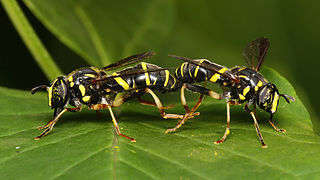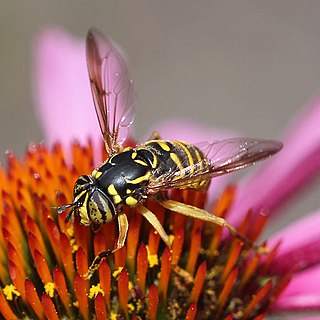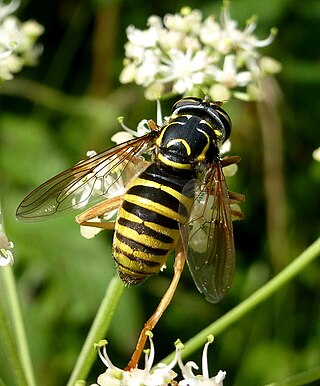
Spilomyia is a genus of hoverflies. Many species in the genus show Batesian mimicry of wasp models, including black and yellow patterns and modified antenna shape.

Spilomyia sayi, the Four-lined Hornet Fly, is a fairly common species of syrphid fly. This species is found from western Canada to northeastern North America. Hoverflies get their names from the ability to remain nearly motionless while in flight. The adults are also known as flower flies for they are commonly found around and on flowers, from which they get both energy-giving nectar and protein-rich pollen. The larvae are known as the short-tailed larvae, suited for moist areas such as rot holes of trees. It is a wasp mimic.

Spilomyia longicornis is a species of syrphid fly, also known as a flower fly or hoverfly, in the family Syrphidae. Although the appearance of S. longicornis is remarkably similar to a vespid wasp, it is a fly and cannot sting. It occurs in North America, east of the Rocky Mountains.
Milesiina is a subtribe of syrphid flies in the family Syrphidae. There are at least 14 described species in Milesiina.

Spilomyia citima, the Western Hornet Fly, is a rare species of syrphid fly first officially described by Vockeroth in 1958. Hoverflies get their names from the ability to remain nearly motionless while in flight. The adults are also known as flower flies for they are commonly found around and on flowers, from which they get both energy-giving nectar and protein-rich pollen. The larvae are known as the short-tailed larvae suited for moist areas such as rot holes of trees.
Spilomyia crandalli, Crandall's Hornet Fly, is a rare species of syrphid fly first officially described by Curran in 1951. This species is found in western North America near the Pacific coast. Hoverflies get their names from the ability to remain nearly motionless while in flight. The adults are also known as flower flies for they are commonly found around and on flowers, from which they get both energy-giving nectar and protein-rich pollen. The larvae are known as the short-tailed larvae, suited for moist areas such as rot holes of trees.

Spilomyia liturata, the Rocky Mountain Hornet Fly, is an uncommon species of syrphid fly. This species is found in western North America along the Rocky Mountains. Hoverflies get their names from the ability to remain nearly motionless while in flight. The adults are also known as flower flies for they are commonly found around and on flowers, from which they get both energy-giving nectar and protein-rich pollen. The larvae are known as the short-tailed larvae, suited for moist areas such as rot holes of trees.
Spilomyia foxleei is a species of syrphid fly in the family Syrphidae.
Spilomyia bidentata is a species of Hoverfly in the family Syrphidae.
Spilomyia boschmai is a species of Hoverfly in the family Syrphidae.
Spilomyia digitata is a species of Hoverfly in the family Syrphidae.

Spilomyia manicata is a species of Hoverfly in the family Syrphidae.

Spilomyia diophthalma is a species of Hoverfly in the family Syrphidae.
Spilomyia graciosa is a species of Hoverfly in the family Syrphidae.
Spilomyia gussakovskii is a species of Hoverfly in the family Syrphidae.
Spilomyia permagna is a species of Hoverfly in the family Syrphidae.
Spilomyia panfilovi is a species of Hoverfly in the family Syrphidae.
Spilomyia wirthi is a species of syrphid fly in the family Syrphidae.
Spilomyia scutimaculata is a species of Hoverfly in the family Syrphidae.
Spilomyia curvimaculata is a species of Hoverfly in the family Syrphidae.






